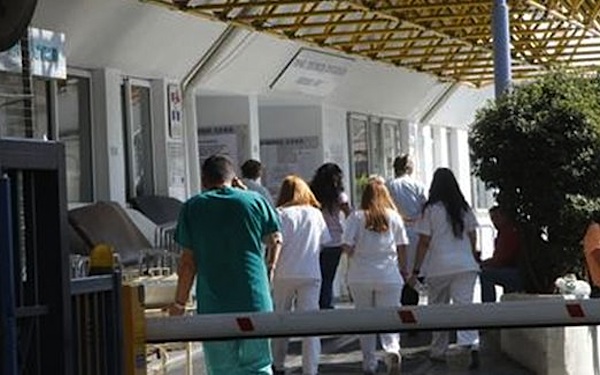Exclusively written for the Sting by Mrs Vassiliki Samartzi, a third year medical student at University of Patras, Greece and Mr Nikolaos Karvelas, first year medical student at University of Athens, Greece. Both students are affiliated with the International Federation of Medical Students Association (IFMSA).
Access to healthcare, one of the core human rights, nowadays is not taken for granted in Greece. The cause: two consecutive crises, that, in a mere six years’ time, have managed to wreck the health system, leaving it unable to sustain itself, the citizens, and the waves of refugees in need.
The cause of this severe degradation was the austerity policies, proposed as a solution to the financial crisis. As recent socioeconomic researches have pointed out, health sector has been the target of constant costcutting policies, which deeply wound the quality of the services provided. As part of these reforms, an introduction of user fees to access healthcare and reductions in coverage have been the ones that mostly elevated inequalities, since access to healthcare became more and more determined by employment, whereas the harsh reality was, and still is, high unemployment rates and loss of income. Subsequently, vulnerable groups have been marginalized, and sometimes even excluded from public healthcare.
Therefore, when the unexpected migration crisis broke out, the already unstable health system suffered a final blow. At a time in which the refugee crisis is sharper than ever, the Greek health system and public infrastructure cannot meet the requirements that dictate our times. More than one million people have tried to reach Europe in 2015, and over 200 000 people in 2016. In Greece, detention areas and hotspots are crowded and hosting refugees residing in appalling hygiene conditions. The data is constantly changing and from March 20, the date of implementation of the EUTurkey agreement, refugees arriving in Greek islands are sent in closed detention centers. It is obvious that there is no specific provision. According to information of Doctors without Borders, “prisoners” in some centers have limited access to water and shelter, sanitary facilities are not properly maintained and food distribution takes place at irregular intervals. Many nongovernmental organizations are trying to offer help, but the refugees’ access to health is limited because the state has not created the necessary infrastructure to help those people, who have to walk long distances at times to gain access to basic services. Thus, the state machine is replaced by individuals who are trying in despair to offer help without any planning.
Unfortunately, awareness on this healthcare crisis is limited, especially concerning our target group, medical students. As the policies of the International Federation of Medical Students’ Associations (IFMSA) on Access to healthcare state, it is our obligation and mission to promote universal health coverage to everyone, undocumented persons included. Efforts have been made from the part of our organization, Hellenic Medical Students’ International Committee (HelMSIC) to develop the medical students’ sensitivity on the subject, through projects, such as project “Chiron” in cooperation with the Medecins du Monde. Students have the chance to experience for themselves, at the open polyclinics of the MdM, how limited access to health sources affects the daily lives of a huge proportion of the population, be it refugees or uninsured locals.
Now addressing the European citizens as eyewitnesses of the inhumane state of the Greek healthcare system, our aim is double: not only to demonstrate how Greece should act as a counterexample regarding the right to health, but also to promote the role of the medical students as defenders of this particular right. Our vision is that, in the future, these students will take effective action as doctors against inequality, and restore healthcare to what it should be: open to every human in need.









